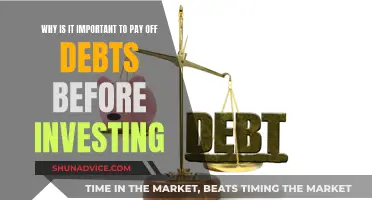
Wefunder is a crowdfunding platform that allows users to invest in startups. The minimum investment amount is $100, and the platform charges a transaction fee of 2% for payments made by bank ACH, wire, or check. The minimum fee is $8, and the maximum fee is $100. For payments made by credit cards, Apple Pay, or Google Pay, Wefunder charges a 5.5% fee with a minimum of $8.
The amount you may earn depends on the type of investment contract the company offers. There are four classes on Wefunder: debt, convertibles, stock with no dividends, and stock with dividends. The time it takes to see a return on your investment depends on the type of investment and the company's performance. It could take several years or more, and there is a risk of losing your entire investment.
| Characteristics | Values |
|---|---|
| Minimum investment | $100 |
| Maximum investment | $124,000 |
| Investment types | Debt, Convertibles, Stock, No Dividends, Stock, Dividends |
| Investment fees | 2% for bank ACH, wires or checks; 5.5% for credit cards, Apple Pay or Google Pay |
What You'll Learn
- Navigate to the Community Round page of the company you want to invest in, enter the investment amount and click invest
- The amount you can invest depends on the specific offering and your status as an accredited investor
- The amount you may earn depends on the type of investment contract the company offers
- Schedule K-1 and Form 1099 are two tax forms you may receive
- After your funding target has been met and at least 21 days have passed since your Form C filing, you can initiate the close of your round at any time

Navigate to the Community Round page of the company you want to invest in, enter the investment amount and click invest
To invest in a company on Wefunder, you must first navigate to the Community Round page of the company you want to invest in. Once there, enter the amount you want to invest and click "invest".
Before you continue, it is important to read through the deal terms, contracts, and FAQs on the right side of the page to better understand the investment you are interested in making.
Next, confirm your investment amount. If the investment has perks, you will see what perks you are eligible for with the investment you are making.
Now, it's time to enter or confirm your investor information. Be sure to decide whether you will invest as an individual or an entity.
Time to decide how you want to pay! Wefunder allows for ACH Banks (US bank accounts only), Credit Cards (limit $10,000 cumulatively, plus Wefunder fees per investment), wire transfers (investments $1000+ only), checks (investments $1000+ only), and Wefunder Cash.
Wefunder charges investors a transaction fee of 2% for payments made by bank ACH, wires, or checks. The minimum fee is $8, and the maximum fee is $100. For payments made by credit cards, Apple Pay, or Google Pay, Wefunder charges a 5.5% fee with a minimum of $8. However, there is no maximum fee cap for these payment methods.
Lastly, review your investment details and click the "Complete Investment" button.
Delta Airlines: Invest Now?
You may want to see also

The amount you can invest depends on the specific offering and your status as an accredited investor
The amount you can invest in different offerings on the Wefunder platform depends on the specific offering and your status as an accredited investor. Some offerings may have a predetermined minimum and maximum investment. In most Community Rounds, the standard minimum investment is $100.
To determine how much you can invest in any offering on Wefunder, it is important to understand whether you meet the requirements to be considered an accredited investor.
A significant number of the offerings available on Wefunder fall under Regulation Crowdfunding, also known as Reg CF. If you meet the criteria to be an accredited investor, you will not be subject to any investment limits when participating in Reg CF campaigns.
If you are a non-accredited investor—which is the case for most investors—the amount you can invest under Regulation Crowdfunding within 12 months depends on your annual income level and net worth. As a non-accredited investor, you have the option to invest the higher of the following:
- If your annual income or net worth is less than $124,000, you can invest 5% of the higher value between your annual income or net worth; or
- If both your income and net worth are equal to or greater than $124,000, you can invest 10% of the higher value between your annual income or net worth, with a maximum investment amount of $124,000.
Is Now the Time to Be All In?
You may want to see also

The amount you may earn depends on the type of investment contract the company offers
Debt
Some local businesses offer a simple loan or revenue share. A simple loan, like your car loan, has a fixed repayment schedule known in advance. Unlike a loan, a revenue share returns a fixed amount of money (such as 2x your investment), but the time it takes to repay depends on how well the business does. The faster the company grows revenue, the quicker you earn a return and the higher your effective interest rate.
Convertibles
Most early-stage technology startups use a Convertible Note or Simple Agreement for Future Equity (SAFE). These will convert your investment to stock at a later date if the company raises a "priced round" from major investors, most often venture capitalists. At this point, you are a shareholder owning equity, and you earn a return if the value of that stock goes up over time, and you are able to sell it.
Stock, No Dividends
When a startup is at a stage where they can afford to pay lawyers tens of thousands of dollars, they will do a "priced round". Like the stock market, you are buying equity at a fixed price per share (or unit for LLCs). If the company is successful, the value of the stock can increase with each subsequent round of financing, until the company is acquired or goes public. Then you earn a return.
Stock, Dividends
While a tech startup almost never offers dividends, a later-stage local business—such as a brewery opening a second location—often will. The type of dividend can vary. Some might offer a fixed dividend per share per year. Some might offer a percentage of profits. A common scenario is also to "swap" the dividend after your investment is repaid. For instance, a brewery might share 80% of its profits until the investors are repaid, and then 20% thereafter in perpetuity.
Coca-Cola: A Refreshing Investment
You may want to see also

Schedule K-1 and Form 1099 are two tax forms you may receive
Schedule K-1 is a federal tax document used to report the income, losses, and dividends for a business' or financial entity's partners or an S corporation's shareholders. It is also used to report income distributions from trusts and estates to beneficiaries. A Schedule K-1 document is prepared for each relevant individual (partner, shareholder, or beneficiary).
Form 1099, on the other hand, is a tax form used to report payments received for goods or services during the year. This includes payments from credit, debit, or stored-value cards, payment apps, or online marketplaces.
If you invest through Wefunder, you may receive a Schedule K-1 if you invest through a Limited Liability Company (LLC). You may receive a Form 1099 if you receive a payment from a company you invested in, such as a quarterly payment on a revenue-share contract.
It's important to note that the tax implications of investing through Wefunder can be complex, and it's always recommended to consult with a tax professional to ensure you're complying with all relevant laws and regulations.
Cash Hoarding: Fear or Greed?
You may want to see also

After your funding target has been met and at least 21 days have passed since your Form C filing, you can initiate the close of your round at any time
Once your funding target has been met, you can initiate the close of your round at any time, as long as at least 21 days have passed since your Form C filing. This is the compliance document you must file with the SEC to collect investments on Wefunder via Regulation Crowdfunding.
When you are ready to close your round, investors will be given a five-day warning and one last chance to edit or cancel their investment. After this, their funds are locked in, and you will work closely with the Wefunder closing team to receive your disbursement.
Wefunder emphasises that investing in early-stage startups is riskier than investing in the stock market. It is entirely possible that you could lose every dollar you invest on the Wefunder platform. Returns on Wefunder investments tend to be long-term, with an average return time of around seven years.
Forging Checks: A Risky Investment Gamble
You may want to see also
Frequently asked questions
The founder(s) of the company you invested in should reach out to you shortly after the Community Round has ended with information on how to claim any perk(s) you may have. If you do not hear from them, you will need to contact the company as they are the ones that take care of perks. Please note that Wefunder does not monitor or facilitate the perks that a company offers during their raise.
Your total net worth is calculated by adding up everything you own and subtracting any debts you have. When investing on Wefunder, do not include the value of your main home in your assets. Likewise, any mortgages or loans you have on that home should not be counted as liabilities (as long as they don't exceed the fair market value of your home).
The following information is for accreditation as an individual and as an entity:
- Income over $200,000 per year for the last two years and expecting to remain the same
- Income over $300,000 per year for the last two years if joint with a spouse
- Net worth over $1 million, excluding the primary residence
- Investment professionals in good standing holding the general securities representative license (Series 7), the investment adviser representative license (Series 65), or the private securities offerings representative license (Series 82).







